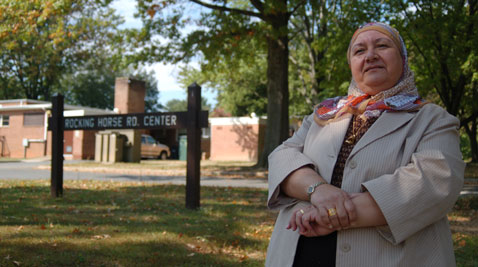ROCKVILLE – In Maryland’s largest school district, community members are once again petitioning to close public schools on major Islamic holidays. And while a Montgomery County Board of Education spokesman said the board cannot legally comply, other districts have accommodated similar requests.
State law requires Maryland schools to close on the Christian holidays of Christmas and Easter, and eight out of 24 counties close on major Jewish holidays as well. The two major Islamic holidays, Eid al-Adha and Eid al-Fitr, are considered “excused absence” or “non-testing” days, but schools remain open throughout the state.
Although the Muslim community in Montgomery County has been fighting to change this for years, the county school board said it cannot close schools for religious reasons, said spokesman Dana Tofig.
Tofig stressed that, in order to close schools on Islamic holidays, the board would need evidence that staying open on those days caused secular, operational problems.
But Zainab Chaudry, vice president of the Council on American Islamic Relations’ Maryland chapter, said the board has not clearly defined or set criteria for these operational problems.

One recently-formed community coalition, Equality 4 Eid, is trying to persuade Montgomery County parents to keep children home on Eid al-Adha – October 15. But Chaudry said school board members have not made it clear how many absentees it would take to persuade them to close.
“There isn’t a specific number [of absentees] that triggers a holiday,” Tofig said. “We look at a lot of data.”
Eid al-Adha, the ‘feast of the sacrifice,’ marks the the end of the ritual Hajj pilgrimage to Mecca. Eid al-Fitr, which was celebrated in early August, marks the end of the Ramadan fast.
While it is illegal to close schools for strictly religious reasons, the standards for what constitutes a valid secular reason is determined on the local level, said Alan Brody, a spokesman for the Maryland Attorney General’s Office. A federal court case determined a high rate of absenteeism was one plausible secular reason, but did not define what “high rate” would mean on a county level, Brody said.
Although it is difficult to estimate the number of Muslims living in Montgomery County, Chaudry said they represent a significant portion of the population.
“The community has been growing over the past several years and there are thousands of American Muslims that reside in Montgomery County,” she said “Every holiday they struggle with whether to send their children to school…a lot of parents feel like their children are second-class citizens.”
While Tofig said Montgomery County schools have recognized Jewish holidays for decades, some counties have recently added closures for religious holidays based on community concern and absentee data.
In Anne Arundel County, Jewish holidays were added to the calendar after a special interest group made several presentations to the county school board approximately 10 years ago, said Teresa Tudor, chair of the county’s calendar committee.
Carroll County added Jewish holidays to its academic calendar 4 years ago after a committee of parents, staff, union leaders and others recommended the change based on data such as absenteeism, said human resources director Jimmie Saylor.
Neither Anne Arundel nor Carroll Counties have received requests to close schools for Islamic holidays, according to Tudor and Saylor.
The Maryland counties that closed for Rosh Hashanah this year were Anne Arundel, Baltimore, Carroll, Frederick, Harford, Howard, Montgomery and Prince George’s.
For Samira Hussein, a Muslim who raised four children in Gaithersburg, Montgomery County, the issue is much larger than school closures.
Hussein and her family have lived in the county for more than 30 years and were targets of multiple hate crimes, including schoolmates physically assaulting her children, she said.
“All of it started within school,” she said. “It came on the bus. It came to the neighborhood. I had to take my children and hide….until my husband came home…that’s how scared we were.”
Although her children have graduated and the county has made progress toward acceptance and equality, Hussein said the underlying problem still exists.
She said students who miss classes for Islamic holidays ruin perfect attendance, have to catch up on lessons and even have to make-up tests. She also said many parents are afraid to inform schools why they are keeping their children home.
“I know many families, they call in sick for their children,” she said. “They don’t want their children to stand out as Muslims.”
Hussein has been a family service worker in the Montgomery County school system for around 10 years, so the school closure policies affect her as well.
“As a staff person myself, I’m affected, “ she said. “When I take off, I have all this anxiety, wondering who is going to take over for me. My Christian and Jewish colleagues, they don’t have to go through the anxiety I go through.”
Baltimore City schools remain open for Jewish and Islamic holidays, which is largely a reflection of the area’s demographics, said Karen N’Dour Webber, the city’s executive director of student support services. According to Webber, the school system has not received any requests to close for Jewish or Islamic holidays.
But Neimah Ryles, whose two children attend school in Baltimore City, said she deals with the same challenges faced by Muslim parents in Montgomery County. She keeps her children home from school during Eid al-Adha and Eid al-Fitr, but worries about the lessons and assignments they miss.
“[The Eids are] very important because it gives us a time to come together and pray together and worship together,” she said. “It would be just like when Christians celebrate Christmas and they want to be home and they want to cook….its that connection you want to have.”
Ryles is not optimistic that her county’s school system will ever recognize her religion’s holidays.
“I don’t believe that it will ever happen,” she said. “But it’s all in God’s hands.”


You must be logged in to post a comment.